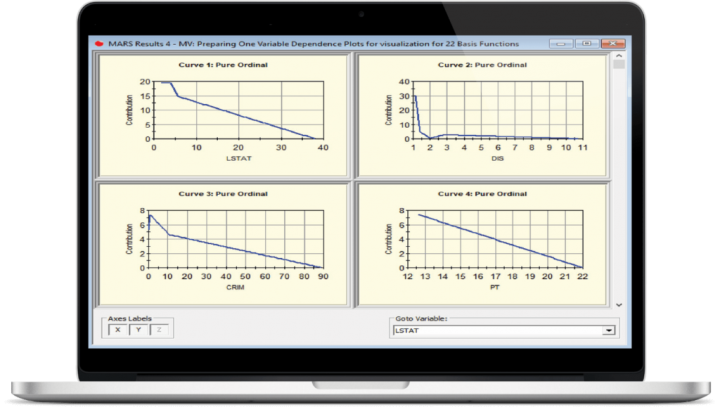Multivariate Adaptive Regression Splines
Introduction
What is MARS® (Multivariate Adaptive Regression Splines)?
-
-
- Grow a large tree
- Prune the large tree
-
-
-
- Forward step (add terms to the model)
- Backward step (delete terms from the model)
-
Features of Multivariate Adaptive Regression Splines (MARS®)
-
-
- Automatic variable selection – MARS® automatically select the variables used in the model via the forward and backward step.
- Automatic nonlinear modelling – MARS® automatically models nonlinear functions via piecewise linear approximations.
- Automatic variable interaction – Determine interactions between predictor variables.
- Automatic missing value handling – Handling missing values with new nested variable techniques.
- Automatic numeric and categorical predictor handling – MARS® automatically handles both categorical and numeric predictors directly.
-
Multivariate Adaptive Regression Splines (MARS®) in Salford Predictive Modeler
Salford Predictive Modeler is an integrated suite of Machine learning and Predictive Analytics Software. It includes various data mining techniques like classification, clustering, association and prediction. Some of the other methods are regression, survival analysis, missing value analysis, data binning and many more. SPM is a highly accurate and ultra-fast platform for developing predictive, descriptive, and analytical models from databases and datasets of any size, complexity, or organisation. The Salford Predictive Modeler software suite includes CART®, MARS®, TreeNet®, Random Forests®, as well as powerful new automation and modelling capabilities not found elsewhere.
Multivariate Adaptive Regression Splines (MARS®) was developed in the early 1990s by world-renowned Stanford physicist and statistician Jerome Friedman and has become widely known in the data mining and business intelligence worlds. The only commercial version of MARS® software is distributed by Minitab. It includes a number of proprietary features, extensions, and enhancements developed by Salford Systems, Jerome Friedman which is exclusive to Salford Predictive Modeler software.
MARS® is an innovative and flexible modelling tool that automates the building of accurate predictive models for continuous and binary dependent variables. It excels at finding optimal variable transformations and potential interaction within any regression-based modelling solution and easily handles the complex data structure that often hides in high-dimensional data. In doing so, this new approach to regression modelling effectively uncovers important data patterns and relationships that are difficult, if not impossible, for other methods to reveal. With the advent of MARS®, regression models can now be routinely and automatically developed for the most complex data structures.

Multivariate Adaptive Regression Splines (MARS) in Salford Predictive Modeler
Why use Multivariate Adaptive Regression Splines (MARS®)?
-
-
- Given a target variable and a set of candidate predictor variables, MARS® automates all aspects of model development and model deployment.
- Multivariate adaptive regression splines (MARS®) enables you to rapidly search through all possible models and quickly identify the “optimal” solution.
- MARS® performs regression techniques along with the search for nonlinearities in the data that helps to maximise the predictive accuracy of the model.
- Multivariate adaptive regression splines (MARS®) have useful features to effectively reduce the number of terms in a model.
- MARS® can automatically select and transform variables and can identify potential interactions between variables.
-
We conduct various training programs – Statistical Training and Minitab Software Training. Some of the Statistical training certified courses are Predictive Analytics Masterclass, Essential Statistics For Business Analytics, SPC Masterclass, DOE Masterclass, etc. (Basic to Advanced Level). Some of the Minitab software training certified courses are Minitab Essentials, Statistical Tools for Pharmaceuticals, Statistical Quality Analysis & Factorial Designs, etc. (Basic to Advanced Level).
We also provide a wide range of Analytics Solutions like Business Analytics, Digital Process Automation, Enterprise Information Management, Enterprise Decisions Management and Business Consulting Services for Organisations to enhance their decision support systems.
